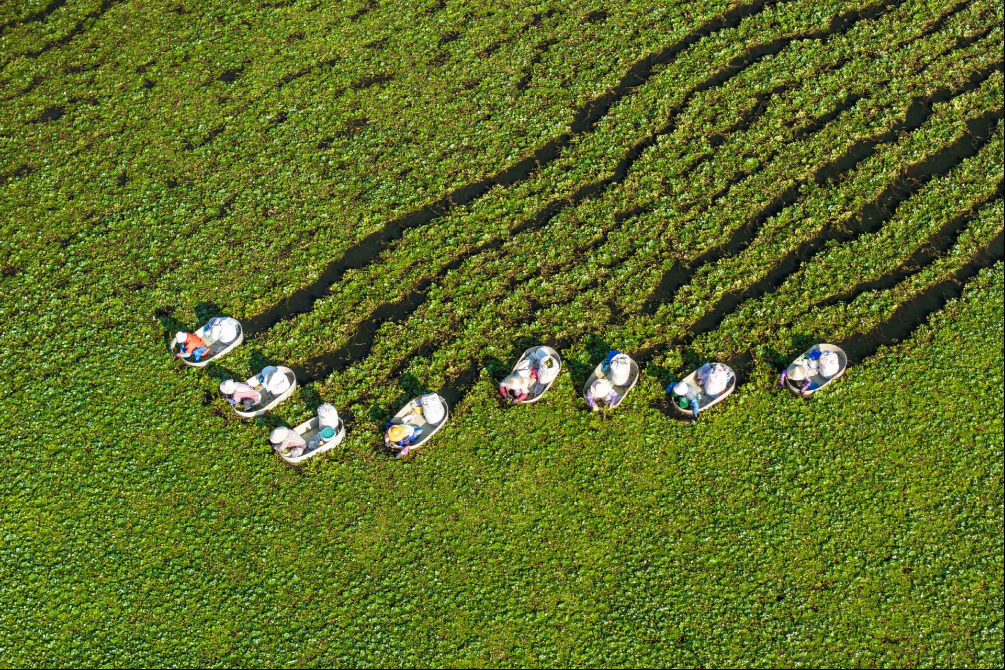New law aims at protection of natl parks
First-ever legislation seeks to enhance management of natural ecosystems

Chinese lawmakers have adopted a new law on national parks, the country's first such legislation, to preserve the authenticity and integrity of natural ecosystems through a stringent legal framework. After a yearlong legislative process involving three reviews, the 63-article law was passed on Friday when the Standing Committee of the National People's Congress, China's top legislature, closed its latest session. The law will take effect on Jan 1.
China announced the establishment of the first batch of five national parks in 2021, spanning a protected area of 230,000 square kilometers and covering nearly 30 percent of the country's key protected terrestrial wild fauna and flora species.
National parks serve as the cornerstone of China's natural protected area system and are included within the scope of national ecological conservation red lines, necessitating the implementation of the strictest protection measures, according to a statement provided by the NPC Standing Committee's Legislative Affairs Commission.
"Formulating such a law is crucial for consolidating the country's experiences in the establishment, conservation and management of national parks, providing a robust legal framework to support the continued high-quality development of national parks, and ensuring that these natural areas are preserved and managed effectively for future generations," the statement said.
Under the law, China will adhere to an integrated approach to conserving mountains, rivers, forests, farmlands, lakes, grasslands and deserts, with emphasis on holistic protection, systematic restoration and comprehensive governance of the national parks.
The law mandates the prioritization of planning for national parks to specify protection and management measures. It also strengthens zoned control by prohibiting human activities in core conservation areas and strictly limiting them in general control zones, while emphasizing biodiversity conservation to safeguard ecosystem security and improve ecosystem quality.
Additionally, the law requires imposing strict legal responsibilities and prescribes specific penalties for various illegal activities that harm natural resources and the ecological environment.
On Friday, an amendment to the Food Safety Law was also passed by the NPC Standing Committee to tighten the supervision over road transport of bulk liquid food and management of infant formula liquid milk.
The amended law, which will take effect on Dec 1, stipulates that road transport operators of key liquid food must have specialized transport containers, personnel, and management systems that meet food safety requirements, and they must obtain a license.
It also clarifies the responsibilities of consignors, consignees and road transport operators and lays out harsh penalties for violations.
For instance, those who forge or use falsified transport records or cleaning certificates for bulk liquid food transport containers, as well as those who fail to perform inspection and certification duties, will be ordered to make corrections and given a warning by food safety supervision and management departments at or above the county level. Violators who fail to make rectifications will face fines ranging from 10,000 yuan ($1,370) to 100,000 yuan.
Road transport operators that fail to meet requirements for bulk transportation of key liquid food and that are deemed to have committed serious violations may be fined between 50,000 yuan and 500,000 yuan.
The amended law also places infant formula liquid milk under the same registration management as infant formula powder, meaning that producers must follow registered product formulas and manufacturing processes and will be held accountable for violations.
China's Food Safety Law was initiated in 2009 and underwent an overhaul in 2015. It has since been modified in 2018 and 2021. The latest amendment was submitted for its first reading in June and second reading this week before the adoption.
Contact the writers at limenghan@chinadaily.com.cn





































